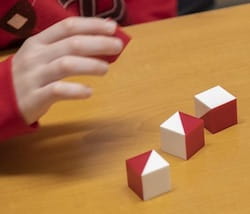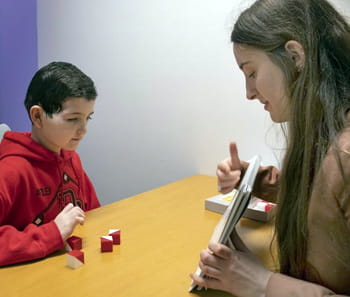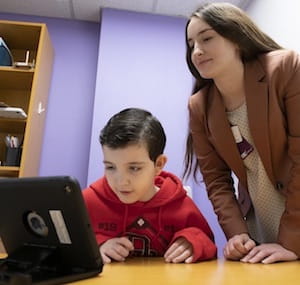View current news below featuring the research, staff and advancements of the Treble-Barna Lab for Pediatric Traumatic Brain Injury Research at UPMC Children’s Hospital of Pittsburgh’s Richard King Mellon Institute for Pediatric Research. Please check back often for continued updates.
Lab Activities and Achievements
2022
Clinical Research Coordinator Lauren Kaseman, BS, was awarded the Best Undergraduate Abstract at the University of Pittsburgh’s 2022 Rehabilitation Institute Research Day event, where she also gave an oral presentation.
2021
Amery Treble-Barna, PhD, was awarded an R03 grant from the National Institute of Child Health & Human Development for her project, “Development and Initial Validation of a Caregiver-report Measure of Rehabilitation Utilization Following Pediatric Traumatic Brain Injury.”
2019
Amery Treble-Barna, PhD, was awarded a K01 Career Development Award from the National Institute of Child Health & Human Development for her project, “Epigenetic Influences on Neurobehavioral Recovery Following Pediatric Traumatic Brain Injury.”
Dr. Treble-Barna and Laura Blackwell, PhD, of Children’s Healthcare of Atlanta, were awarded the Outcome Studies Grant from the American Academy of Clinical Neuropsychology Foundation for their project, “Evaluating the Impact of Neuropsychological Evaluation on Unmet/unrecognized Needs and Service Utilization Following Pediatric TBI.”
Research assistant, Noelle Marousis, BS, was awarded Best Poster Presentation by an Undergraduate at the University of Pittsburgh/UPMC Rehabilitation Institute Research Day for her presentation, “Can Personal Biology Account for Unexplained Heterogeneity in Neurobehavioral Outcomes following Pediatric Traumatic Brain Injury? Feasibility and Acceptability of Research Methods.”
2018
Amery Treble-Barna, PhD, was selected as a KL2 Scholar in the University of Pittsburgh Clinical and Translational Science Scholars Program funded by the National Center for Advancing Translational Sciences.
Presentations at Scientific Meetings
2022
Research Assistant Aboli Kesbhat, BS, and Amery Treble-Barna, PhD, delivered a poster presentation virtually, entitled “Psychosocial Risk in Pediatric TBI: Reliability of the Psychosocial Assessment Tool,” at the Annual Meeting of the International Neuropsychological Society.
Lauren Kaseman, BS, and Amery Treble-Barna, PhD, conducted a poster presentation virtually, entitled “Racial, Health Insurance, and Urban-rural Disparities in Rehabilitation Utilization and Unmet Needs Among Pediatric Patients with Traumatic Brain Injury,” at the Annual Meeting of the International Neuropsychological Society.
2021
Amery Treble-Barna, PhD, presented “BDNF Val66Met and Neuropsychological Function Following Pediatric Traumatic Brain Injury” at the National Academy of Neuropsychology meeting in Washington, D.C.
2020
Clinical research coordinator Jamie Patronick, BS, was accepted to present a poster entitled, “Review of genetic factors associated with recovery after traumatic brain injury: A 4-year update,” at the 2021 annual meeting of the International Neuropsychological Society (a virtual event).
Research assistant Namita Thomas, BS, presented a poster, entitled “Needs and service utilization following pediatric traumatic brain injury,” at the annual meeting of the International Neuropsychological Society in Denver.
2019
Amery Treble-Barna, PhD, presented, “Caregiver-reported rehabilitation utilization in the first 6 months following early childhood traumatic brain injury,” at the 13th World Congress on Brain Injury in Toronto, Canada.
Research coordinator, Srivatsan Uchani, BS, presented a poster, entitled “Brain Derived Neurotrophic Factor (BDNF) DNA Methylation and Brain-related Clinical Outcomes: A Systematic Review,” at the annual meeting of the International Neuropsychological Society in New York.
Research coordinator, Jamie Patronick, BS, presented a poster, entitled “Assessment of Acute Neuropsychological Functioning Following Pediatric TBI Using the NIH Toolbox-Cognition Battery,” at the annual meeting of the International Neuropsychological Society in New York.
Research assistant, Noelle Marousis, BS, presented a poster, entitled “Can Personal Biology Account for Unexplained Heterogeneity in Neurobehavioral Outcomes Following Pediatric TBI? Feasibility and Acceptability of Research Methods,” at the annual meeting of the International Neuropsychological Society in New York.
Dr. Treble-Barna presented, “Influence of Candidate Inflammation-related Genes on Neurobehavioral Recovery Following Traumatic Brain Injury During Early Childhood,” at the annual meeting of the International Neuropsychological Society in New York.
2018
Graduate student, Navya Kamath, PhD, presented a poster, entitled “Ethnicity, SES, and Adaptive Function as Predictors of Health-related Quality of Life Among Children and Adolescents with Spina Bifida Myelomeningocele,” at the Annual Meeting of the International Neuropsychological Society in Washington, D.C.
Research coordinator, Srivatsan Uchani, BS, presented a poster, entitled “Adverse Childhood Experiences and Neuropsychological Outcomes Among Adults with Moderate to Severe Traumatic Brain Injury: Preliminary Results,” at the annual meeting of the International Neuropsychological Society in Washington, D.C.










 Under the leadership of
Under the leadership of  Funded by the National Institute of Child Health & Human Development, the Treble-Barna Lab is currently enrolling children with TBI or orthopedic injuries into a study examining the influence of epigenetic factors on neurobehavioral recovery. Over the last decade, the field of epigenetics has become central to studying the modulation of genetic phenotypes by environmental factors. Broadly defined, epigenetics involves biochemical processes that regulate gene expression without altering the corresponding primary DNA sequence. Through epigenetic processes, the social and biological environment of an individual impacts when and to what extent genes are expressed within each cell type.
Funded by the National Institute of Child Health & Human Development, the Treble-Barna Lab is currently enrolling children with TBI or orthopedic injuries into a study examining the influence of epigenetic factors on neurobehavioral recovery. Over the last decade, the field of epigenetics has become central to studying the modulation of genetic phenotypes by environmental factors. Broadly defined, epigenetics involves biochemical processes that regulate gene expression without altering the corresponding primary DNA sequence. Through epigenetic processes, the social and biological environment of an individual impacts when and to what extent genes are expressed within each cell type. Clinical neuropsychologists aim to understand the nature of cognitive and behavioral problems in children with TBI by conducting comprehensive neuropsychological evaluations, to identify evidence-based interventions and environmental accommodations tailored to the unique needs of each child. This also requires educating and empowering the child’s caregivers, medical providers, and school personnel to follow through with the recommended services. To our knowledge, no studies have examined the impact of the neuropsychological evaluation on reducing unmet/unrecognized needs or increasing service utilization in children with TBI. With funding support from the American Academy of Clinical Neuropsychology Foundation, the Treble-Barna Lab is currently enrolling children with TBI into a study comparing unmet/unrecognized needs and service utilization in children who did and did not receive neuropsychological evaluation within 1 year post-injury.
Clinical neuropsychologists aim to understand the nature of cognitive and behavioral problems in children with TBI by conducting comprehensive neuropsychological evaluations, to identify evidence-based interventions and environmental accommodations tailored to the unique needs of each child. This also requires educating and empowering the child’s caregivers, medical providers, and school personnel to follow through with the recommended services. To our knowledge, no studies have examined the impact of the neuropsychological evaluation on reducing unmet/unrecognized needs or increasing service utilization in children with TBI. With funding support from the American Academy of Clinical Neuropsychology Foundation, the Treble-Barna Lab is currently enrolling children with TBI into a study comparing unmet/unrecognized needs and service utilization in children who did and did not receive neuropsychological evaluation within 1 year post-injury.